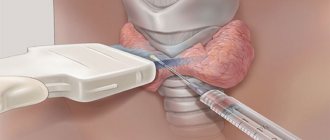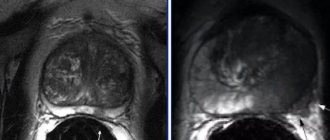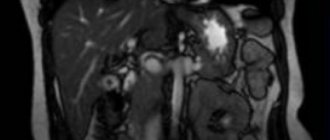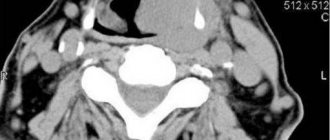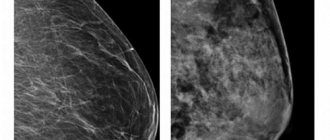The thymus, or thymus (thymus) gland, is an organ that is responsible for immunity. Translated from Greek “thymos” means vital force.
From birth, it prepares our body to meet bacteria, viruses and other foreign microorganisms. But this tiny gland performs not only a protective function, it produces thymic hormones. They promote cell restoration, thereby slowing down the aging of our body.
What is the thymus gland?
The thymus gland (thymus) is a small but extremely important organ of the endocrine system, located in the upper part of the sternum. It is shaped like a two-pronged fork (hence the name). The thymus begins to form as early as 6 weeks of pregnancy. The size and mass of this gland changes throughout life. In newborns, its weight is about 15 g, and by the time of puberty it reaches 37 g. Moreover, after 70, it weighs only 6 g.

The thymus gland's key role is to produce and reject T lymphocytes, the cells of the immune system. Therefore, it is very important that its development occurs within normal limits. And only one research technique can determine this as accurately and without harm to the child’s health as possible - ultrasound of the thymus.
Thymus shape
The thymus gland, or thymus, got its name precisely because of its original appearance, reminiscent of a fork with two prongs. However, only a healthy organ looks this way, and as it becomes sick, it begins to resemble a swollen sail or a butterfly. The organ grows until the child is 10 years old, and upon reaching adulthood it begins to shrink.
According to its anatomy, the thymus is small in size, soft in consistency and pinkish-gray in color. It has a lobular structure, that is, it is divided into two lobes, which are usually either fused or very closely adjacent to one another. The upper one is usually wider, but the lower one is narrower.
The entire thymus gland is covered with connective tissue that forms a capsule, which underneath contains T-lymphoblasts produced in the thymus. These specific cells ensure the functioning of the immune system, fighting foreign microorganisms, but without affecting the person’s own body.
How is the procedure done?
To begin with, the child takes the position necessary for the study (usually sitting or lying down). Ultrasound of the thymus gland in an infant is performed in the hands of the parent. Then a special gel is applied to the small patient’s chest to improve the conductivity of ultrasound radiation. Using a special device, the doctor scans the desired area. Based on the image displayed on the monitor, the specialist determines the condition of the endocrine organ and makes an appropriate conclusion. The whole procedure takes no more than 10–15 minutes.

Thymus pathologies
The most dangerous type of thymus gland pathology is a congenital anomaly. In such cases, the organ begins to produce lymphocytes, which are aimed not at destroying foreign microorganisms, but the cells of its own body. Autoimmune pathologies of the chronic type are also very dangerous, since because of them the body begins to weaken greatly, and therefore bacteria and various viruses can multiply unhindered in the body of a sick person. In such cases, people have to spend their whole lives on drugs that are designed to improve weak immunity.
In addition, disruption of the thymus may occur:
- due to irradiation of the body with a high dose of an ionizing substance;
- genetic predisposition;
- hazardous environmental conditions in the place of residence;
- exposure to radiation during pregnancy or violation of the rules for taking medications during this period.
What should you do before undergoing an ultrasound?
No special preparation is required for ultrasound examination of the thymus gland in children. However, parents need to discuss the details of the upcoming procedure with the child in advance, explain how it will take place and that there is absolutely nothing to be afraid of. The presence of adults during the examination will also help create a favorable emotional background and allow the doctor to calmly carry out his work. In addition, you need to inform the specialist in advance about your recent or current use of any medications. If the child is wearing spacious and quickly unfastened clothing, this will greatly simplify the doctor’s task and reduce the procedure time. It is also advisable to know the exact weight of the baby. This is necessary for prompt calculation of gland parameters.
More detailed instructions can always be obtained during your telephone appointment.
Sizes of the thymus
As mentioned earlier, the thymus is a very small organ, so its length usually does not exceed 5 cm and width - 4 cm. But the weight of the organ depends entirely on the age of the person. Usually at birth the standard weight is 12 grams, and as it grows older it can reach 40 g. In the period of 16-18 years, atrophy gradually begins - by retirement age the normal weight of the thymus is only 15 grams, and by the age of 80 - 6 grams.
With atrophy, the lower and lateral sections of the thymus are replaced by adipose tissue. It is not known for certain why this happens, but many doctors agree that the discovery of this mystery will help reverse the aging process.
Indications for ultrasound examination of the thymus in children
Ultrasound of the thymus is recommended if the baby has the following symptoms:
- frequent colds (up to 10 times a year);
- the common cold is often severe and results in complications (pneumonia, bronchitis, etc.);
- the temperature rises to 37.5 and stays there for a long time;
- a network of blood vessels appears on the chest;
- rapid and difficult breathing;
- heart rhythm disturbance (arrhythmia);
- general weakness, increased fatigue, complaints of chest pain;
- the occurrence of allergic reactions;
- enlarged lymph nodes, tonsils or adenoids;
- profuse regurgitation.
Thymus diseases and their symptoms
Since the thymus regulates the functioning of the immune system, disruption of its activity often leads to serious diseases.
There are quite a lot of pathologies that affect the gland: from genetic factors that appear after birth to cancer in old age.
Aplasia and hypoplasia (DiGeorge syndrome)
The disease is characterized by underdevelopment or complete absence of the thymus gland due to a genetic mutation. Immune cells do not mature, so the body is defenseless against infections. Most often, hypoplasia occurs when the organ is poorly developed, but it is still there.
With the "Swiss syndrome" there is a risk of death at an early age. Cure is possible only after a bone marrow transplant or tissue culture of the thymus gland.
Reference! Swiss syndrome is a severe form of immune deficiency in infants of the first year of life, which is manifested by pulmonary infections, oral candidiasis, intestinal malabsorption, and malnutrition. The term received its name after the occurrence of a serious immune deficiency in children living in Switzerland.
Typical signs:
- shortened cavity between the nose and upper lip;
- increased distance between the eye sockets;
- low location of the ears;
- small size of the upper or lower jaw.
In addition to true hypoplasia, there is also acquired hypoplasia. It can develop after a severe form of pneumonia, radiation therapy, or prolonged purulent processes.
Hyperplasia
Unlike atrophy, hyperplasia is an enlargement of the thymus due to the proliferation of its tissues. Occurs due to endocrine disorders, cancer, steroid use, the body's response to 3-4 degree burns and serious injuries, after chemotherapy.
Symptoms:
- skin cyanosis;
- enlarged tonsils and lymph nodes;
- hacking cough;
- increased sweating;
- low blood pressure;
- tendency to colds.
The main treatment method for hyperplasia is surgery.
Timoma
This is a neoplasm in the thymus gland. Most often, the disease affects people over 40 years of age. The insidiousness of the disease is that in the early stages it does not manifest itself in any way. Benign thymoma grows slowly, does not go beyond the organ and does not make itself felt for years.
A person feels the first signals when the tumor puts pressure on the mediastinal organs. When the tumor extends beyond the thymus, inferior vena cava syndrome occurs.
Symptoms:
- chest pain radiating to the shoulder, cervical region, between the shoulder blades;
- heaviness in the head;
- swelling and bluish tint of the facial skin;
- drooping upper eyelid;
- cough;
- dyspnea;
- noise in ears.
Treatment depends on the extent of the growth. Most often this is a thymectomy - surgical removal of the tumor.
Literature
- Vasiliev A.Yu., Olkhova E.B. Fundamentals of ultrasound diagnostics in pediatrics and pediatric surgery – M.: Strom, 2021. – 340 p.
- Gurevich A.I., Zubareva E.A., Boguslavskaya M.A. et al. Ultrasound research methods in pediatrics (methodology and age standards): methodological recommendations // Series “Best practices in radiation and instrumental diagnostics”. – Vol. 26. – 2nd ed., revised. and additional – M.: GBUZ “NPKTs DiT DZM”, 2021. – 54 p.
- Pykov M.I., Vatolin K.V. Children's ultrasound diagnostics - M.: Vidar, 2001. - 630 p.
Hormone production
Another important question in this topic is what hormones the thymus produces and what their role is in the body. With the help of thymosin and thymopoietin, transformed lymphocytes provide the body with the maximum level of protection. And the hormone thymulin improves the level of regeneration, because the level of phagocytosis increases.
In addition, thymus hormones provide a nootropic effect for the body, and also stabilize the central nervous system and reduce irritability, so that a person becomes mentally much more stable.
Symptoms
Ultrasound is usually used to diagnose thymus diseases - this is the easiest way to detect thymic hyperfunction. This usually indicates the presence of autoimmune diseases. In addition, the main signs of problems with the thymus in children are a decreased level of muscle tone, weight problems, profuse sweating, pale skin, abnormal heart rhythm and enlarged tonsils with lymph nodes.
In adults, there are fewer symptoms - usually the patient begins to experience severe muscle fatigue and heaviness in the eyelids. Also, breathing problems often begin, and after infectious diseases, the recovery process becomes very long.
Symptoms of disease or developmental disorders of the thymus gland
In order to promptly identify thymus pathology, parents should pay attention to deviations of varying degrees of severity, which may indicate a disease or disorder of the development of the thymus gland:
- Frequent incidence of colds in children.
- Protracted course of various diseases, with frequent complications.
- Enlarged lymphoid tissue - lymph nodes, tonsils, adenoids, tissue on the back of the pharynx.
- Pale and/or marbled pattern on the child’s skin.
- High baby weight at birth.
- The child quickly loses and quickly gains weight.
- Cough outside of a cold, which gets worse when the child is lying horizontally.
- Sweating, low-grade fever for a long time outside of colds.
- Hyperhidrosis, cold extremities.
- Visible venous network on the baby's chest.
- Cyanosis (blue discoloration) of the nasolabial triangle during exercise (crying, running)
- Frequent regurgitation, hiccups, belching
- Dyspnea
- Heart rhythm disturbance
If there is a suspicion of thymus pathology, the doctor may prescribe additional examination methods:
- Ultrasound of the thymus gland,
- CT,
- MRI,
- x-ray,
- general blood analysis,
- immunogram,
- blood chemistry,
- blood for hormones.
Thymic deficiency is amenable to immunocorrection, which is individually selected by an allergist-immunologist. It is worth noting that timely diagnosis of thymus gland pathology is especially important in the first year of a child’s life, when the child begins to receive vaccinations.
For detailed advice on the role of the thymus gland in the life of a child in the first year of life, please contact medical pediatricians
See also on the topic:
- Pediatric surgeon
- Pediatric ultrasound
- Pediatric dermatologist
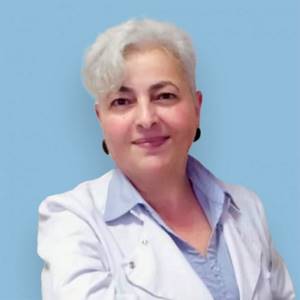
Treatment of thymus diseases
Treating any thymus disease is very difficult, and also takes a long time. For example, chronic autoimmune diseases cannot be cured at all, but only to reduce the level of their negative effects with the help of immunomodulators and B vitamins. This allows you to slightly improve the protective functions of the body and provides protection against other infectious diseases.
That is why it is very important to follow the doctor’s recommendations and take all prescribed medications, as this will help reduce the risk of destruction of still healthy organ cells. In addition, doctors also recommend following preventive measures and taking vitamins, especially in the autumn-winter period, when you need to strengthen your immune system more than ever.
Treatment of an enlarged gland
Often, when the thymus gland is enlarged, drug treatment is not required. The exception is rare complex cases of thymomegaly.
But every effort should be made to strengthen the child’s immunity. Doctors recommend:
- Taking vitamins and a diet rich in proteins.
- Hardening and playing sports.
- Maintaining a daily routine.
- Vaccinations for thymomegaly can be done, but you must first give the child an antihistamine prescribed by the pediatrician.
- Contact with ARVI patients should be avoided.
- Avoid your baby's consumption of allergenic foods.
And a very important point. If your child has an enlarged thymus gland, he should not take acetylsalicylic acid as an antipyretic. Aspirin can speed up the growth of thymus cells.

What is the value of thymus ultrasound results?
The thymus gland is located in the retrosternal space; despite its small size (up to 20 g after delivery), it is visible quite well, which makes it possible to determine almost all abnormalities based on ultrasound results. The main goal of this technique is to timely identify and respond to the most dangerous violations in the structure of the organ, namely:
- enlarged gland syndrome (slight excess of the norm);
- thymomegaly.
The latter can be functional (during the period of active immunity to eliminate the virus/infections) or pathological. Pathological thymomegaly is one of the most serious threats to babies under one year of age. Among children who died at this age, more than 60% suffered from enlargement of the thymus canal.
In addition to studying possible deviations in size, ultrasound of this organ can provide useful information for immunology, indicate the causes and intensity of diathesis, and help in identifying dangerous allergic reactions. Ultrasound is effective in detecting thymic hyper(hypo)plasia, an abnormal development.
